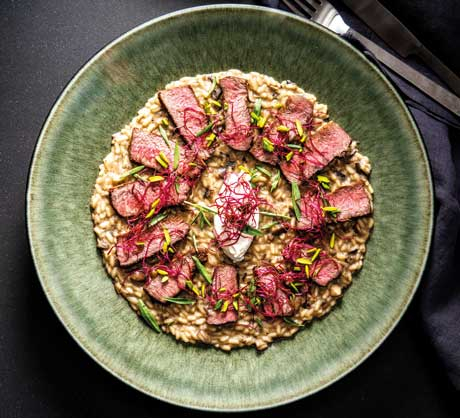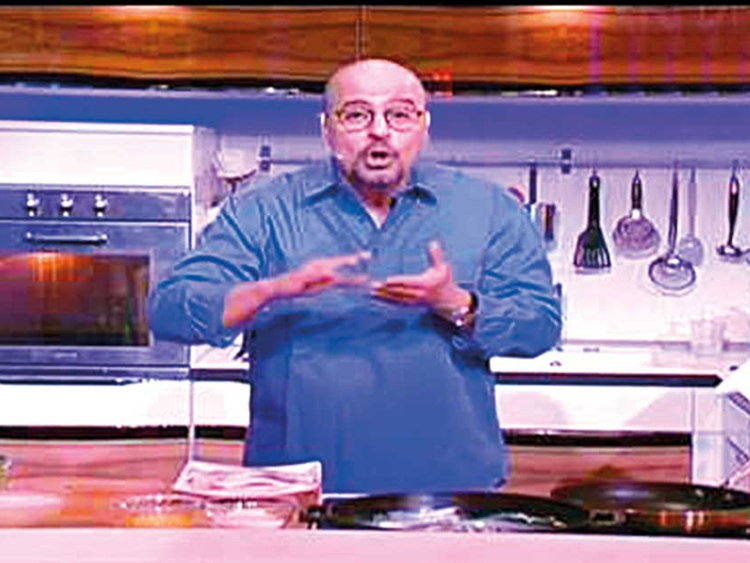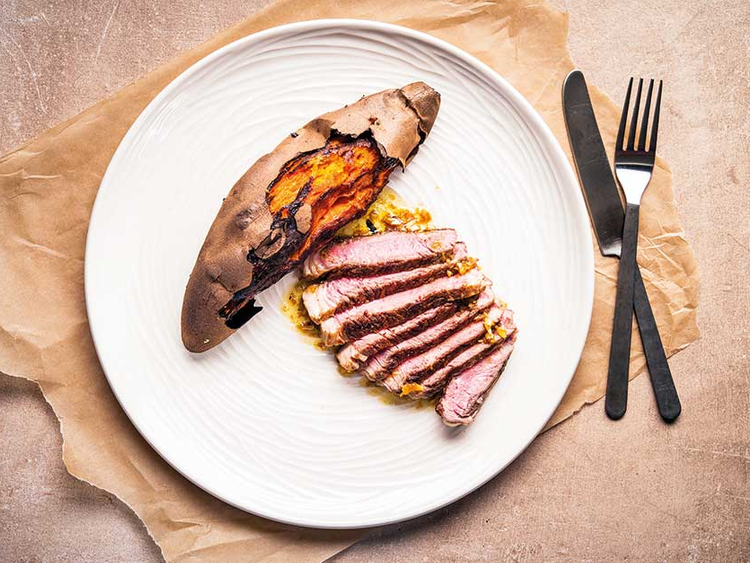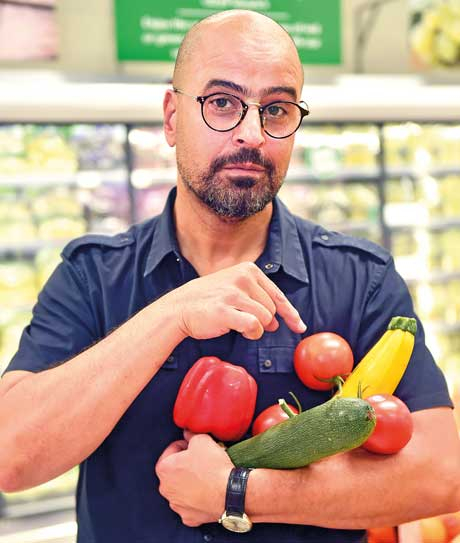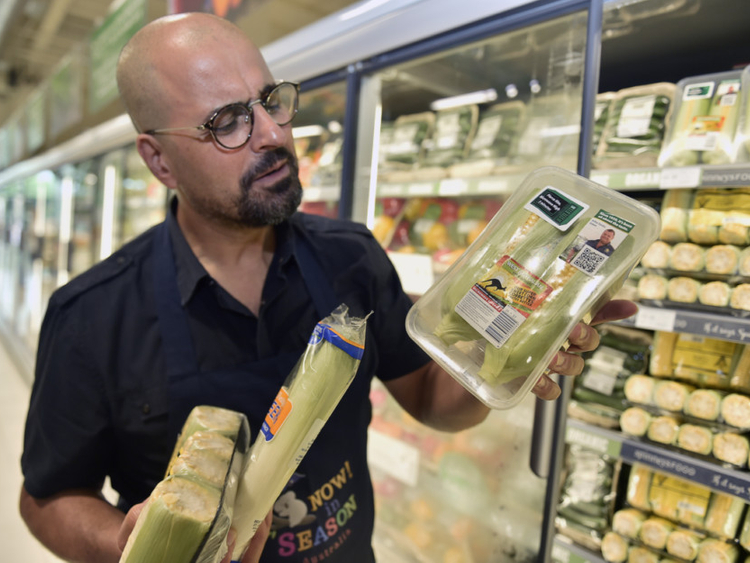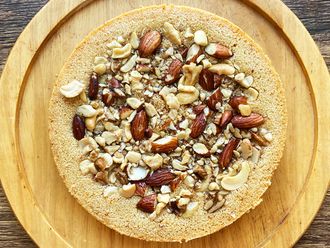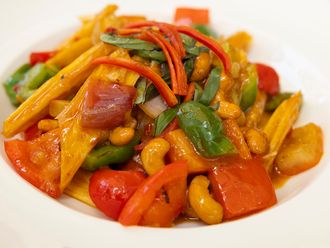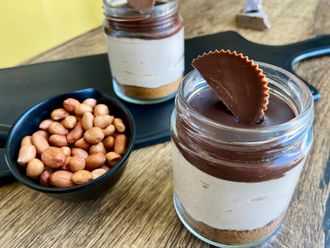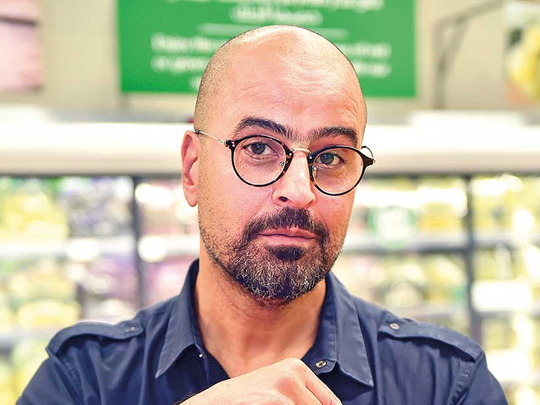
You should never trust a skinny chef, goes the old saying. Chefs everywhere, from Michel Roux to Massimo Bottura, have weighed in on both sides of the debate for several years now. Our own Tarek Ebrahim is one of those who disagrees.
“It’s crucial for a chef to be healthy and light on his feet,” he says, talking to Gulf News tabloid! at Spinneys Umm Suqeim, where he’s promoting Australian produce as part of the country’s Now! In Season marketing campaign. Through to October, citrus fruit and apples are available in stores as part of the campaign, a strategic initiative developed in collaboration with government and industry.
“Try walking to your car while holding a 10-kilo watermelon,” he continues. “By the time you reach it, you’re out of breath. The stress you’re putting on your system is tremendous! But that’s the weight — or more — that we carry around on our bodies every day.”
Nearly 75 per cent of the UAE is overweight, according to the World Health Organisation, and over 30 per cent of residents are overweight. Like the rest of us, then, Tarek has been fighting his own battle with an ever-expanding waistline — except that he’s done so publicly. In 2014, Friday magazine documented how he lost over 10kg, but by March last year, the numbers had crept back up to 108kg.
“I stopped walking,” he says when I ask how the bulk won out. “I got really busy behind the computer. And when you’re sitting down, you crave food. My enemy is sweets, so I’d grab a Kit Kat, and my blood sugar would shoot up. Then it would crash.” That cycle of constant eating as insulin levels peak and crash leads was his undoing, he says. “Before you know it, you’ve gained 10kg. That’s when you become disgusted and depressed. And you say, forget it, I’m not dying. But then I looked at myself in the mirror and I looked really ugly. I didn’t like myself.”
BACK ON TRACK
That emotion — and his media career — led the Dubai resident to work back down to 89 kilos, his present weight, and he’s now on a mission to hit a target of 83 kilos by the end of the year. “As my wife always says, there’s nothing in life that tastes better than being light on your feet. Not skinny, just move lighter. You sleep better, you’re not snoring. You’re fitting into your clothes. You’re not carrying a belly that’s half a metre in front of you. And you save money because all the smaller clothes cost a lot less,” he says. “It’s just a happier life. At least for myself, I’m a happier man when I’m lighter.”
The first Arab to be named Master Chef by the World Association of Chef Societies says it comes down to two things: self-awareness and diet. “You have to discover and understand yourself and your system. And everyone has a different weakness. Mine is sweets.”
Now he says he eats three times a day (except Fridays, his cheat day), with an occasional mid-morning snack, and walks for an hour around the Dubai Marina each day. “[But] diet is more important than exercise. You can exercise as much as you want. But if you’re still eating and eating yourself away, you’re going to be big. And the best way to control what you put into your mouth is by cooking your own food.”
At the moment he’s hard at work on the first of what he hopes will be five books dedicated to explaining his cooking philosophy. As someone who’s an ambassador for meat, that’ll be first out the door — hopefully within the next six months. [As I rang him this week, to confirm a fact for this story, he was putting together a package for his publisher.] “I want to look at how to use every part of the animal — from nose to tail, or head to toe, call it what you want. And it will be for lamb and beef and goat. And all the side dishes, with a lot of Egyptian elements.” Before that, though, he’s back on TV.
As of next week, Ebrahim is back in the studio kitchens for Al Qahera Al Youm, where he will demonstrate new recipes each Tuesday and Thursday. The Cairo-based talk show on Egyptian current events and culture clocks millions of viewers worldwide and is broadcast on OSN’s Alfa TV. During the course of the three-hour show, the Alexandria native will recreate recipes from famous chefs on air, breaking them down for home cooks and occasionally critiquing them. Then he’ll sit down with a celebrity for an intimate lunchtime chat.
Sharing the love
“I like the way TV reaches people, even chefs — and it allows me to show people how to cook, how you can do so much with just three or four ingredients,” he says.
Ebrahim believes we’ve lost touch with our food, particularly in developed countries, thanks to the rise of the ready meal. “I grew up with seasonal food — my mother spent tomato season preserving the fruit in any way she could. But my daughter thinks pasta comes from a tree,” he exclaims. “That’s this generation — with everything canned and ready to eat, we don’t cook any more. Now, after cancer has taken over the world, we’re going back to our mothers and grandmothers — and that’s why we’re addicted to Food Network. But we’re in danger of going to the other extreme, of doing too much to food, and changing it completely in the process.”
Simplicity, then, brings great results, the food evangelist believes. Ebrahim comes back to that a lot during our conversation. As we walk through the supermarket, he picks up different fruit and vegetables and tells me how to cook them. Each time, he comes back to the same — salt, pepper, some fat, maybe another ingredient such as onions or spice. That’s it. “I don’t think by adding too many flavour I’m doing anything. I’m basically taking away from the food,” he says. Have you ever had a sweet strawberry for example? Or a fig that was just perfect? Did you add anything to it? No, you don’t need to. If you choose food that’s fresh and seasonal, you don’t need to do anything to it.”
Ebrahim’s advice to home chefs, then, is to simply season produce with salt, pepper and maybe a little butter to concentrate the natural flavour, before popping it in the oven. “If you reduce, or concentrate the amount of water in roasted vegetables, for instance, you end up with something extremely delicious. Without doing anything, you’re enhancing the flavour. And the result is heavenly.”
His recipe for a nice piece of meat is the same: grill it, season it, and you’re done.
Sounds too simple to take seriously? Well, as he says, why should food be complicated? If it’s simple, we’ll cook more often. And if we watch what we put in our food, we’ll be able to keep our weight in check more easily.
-Although he loves eating, Keith’s gluten intolerance and ongoing battle with the bulge has forced him to take a closer look at what he puts into his mouth.
A way with veg
Carrots are boring, I tell chef Tarek Ebrahim, and he nearly bites my head off. “That’s because you don’t know what to do with them!” he exclaims. “Be creative — the sky’s the limit!” I put him to the test with a variety of different produce, so I can vary my weekly shop. Here’s what he came back with:
Kale: It’s a superfood, but most people chop it up for salad. But blanch it in salted hot water for a minute to soften its fibrous leaves and then add it to your salad — that makes it easier to chew and instantly palatable.
Leeks: “The leek is the king of the onion family,” Ebrahim says, advising it be treated as such. Once the outer leaves are removed, “simply braise it with a little butter, salt and pepper, and voila there you go — simply fantastic!”
Avocado: Spread on toast for Instagram — yes. But avocado also works as a dip, as in guacamole, or, when mashed and blended with cold milk and seasoned, as a soup.
Carrots: They’re roots and can vary in sweetness, so Ebrahim advises popping them in the oven with seasoning and herbs of your choice until charred. That’s a sign their liquid content is reduced, and they’re ready to go.
Butternut squash: Forget peeling it, simply place the halved squash in the oven for about half an hour, until lightly brown. Remove, deseed, peel and you’ve got the makings of a soup, a mousse, stuffing for pasta or the filling for a pie.
Marrow: The Arabian kitchen knows marrow best for kousa mahshi — stuffed with minced meat or rice. Ebrahim suggest treating them like aubergines and using them as the base for babghanoush or moutabbal — baked for 10-15 minutes on each side, water drained, add in chopped garlic, tahini, salt and pepper and a spritz of lemon juice.
Australian Oyster Blade Mushroom Risotto recipe
Serves 4 | Cooking time: 20 minutes
Ingredients
1.4kg Australian Oyster blade or (flat iron steak)
1 cup assorted mushroom
3 small shallots fine chopped
1 large clove of garlic mashed
1 baby leek finely chopped
1 medium carrot fine chopped
1 ½ cup Egyptian rice
½ cup of rice vinegar + ½ tbsps sugar mixed
3 ½ cups beef stock hot
4 tbsps of Labnah
Handful Rutabaga Micro green
Lime juice
5 tbsps. Parmesan regiano
Salt and pepper to taste
Directions
1. On a hot grill, place the oyster blade steak and cook to medium, or to your liking.
2. Place the steak in clean plate and cover very loosely with aluminium foil keep warm.
3. Place the mushroom in a sauce pan on a low heat and cook until completely dry and most of the liquid has evaporated.
4. In a suitable pan add some oil, shallots, garlic carrots and leeks add rice and stir for 5 to 8 minutes. Add the vinegar mixture, stir for 3 minutes.
5. Add the stock in three stages, allowing the rice to absorb the liquid before each addition.
6. Season the steak with salt and pepper and slice the rested oyster blade around into 2mm thick slices.
7. When the risotto is cooked to your desired consistency add the mushroom, Labnah, Parmesan and stir. Check and adjust the seasoning.
8. To assemble, place enough risotto in a centre of a place top with slices of the oyster blade and garnish with the extra labnah. Garnish with the microgreens.



